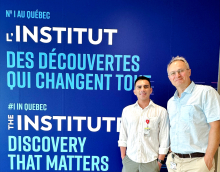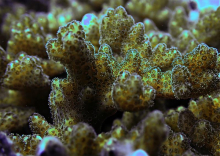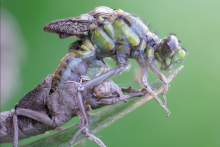
McGill scientists develop cleaner, cheaper way to make lithium-ion batteries
A team of McGill University researchers, working with colleagues in the United States and South Korea, has developed a new way to make high-performance lithium-ion battery materials that could help phase out expensive and/or difficult-to-source metals like nickel and cobalt.

Study reveals trained immunity may cause lung damage
Trained immunity – a process being explored in vaccine and therapy development to boost immune defences – appears be counterproductive in certain contexts, researchers at McGill University and the Research Institute of the McGill University Health Centre (The Institute) have found.

Gender bias holds back female surgeons, study finds
Women now make up over half of medical students in Canada, but only one-third of practising surgeons. A new study suggests part of the gap stems from gender norms embedded in workplace culture. The researchers at McGill University say subtle but persistent biases may be driving women out of the field.

Perceived social status tied to cardiovascular risks in women but not in men
Women who see themselves as having lower social status are more likely than other people to show early signs of heart stress linked to future disease risk, according to a new study led by researchers at McGill and Concordia universities.

New discovery remarkably improves immunotherapy in bladder cancer and beyond
BCG therapy—the gold standard treatment for non-muscle invasive bladder cancer (NMIBC), where the cancer has not penetrated the muscle layer—is one of the earliest forms of cancer immunotherapy.

How tapping into nurses’ full potential could ease health system strain
As health care systems across Canada and beyond struggle with staff shortages, international experts are backing a promising strategy: expanding the role of advanced practice nurses.

The ‘Montreal Model’ of ketamine therapy yields more sustained depression relief
A first-of-its-kind clinical trial found that ketamine’s benefits for treating severe depression can be improved when combined with psychotherapy and supportive treatment environments.
Led by researchers at McGill University, the study suggests this approach can yield valuable therapeutic experiences that lead to longer-lasting relief than standard treatment.

How disrupted daily rhythms can affect adolescent brain development
A new McGill University-led study suggests that disrupting the body’s internal clock during adolescence can alter how the brain responds to an in-utero risk factor linked to certain brain disorders.

Airbus and McGill University are driving innovation in aerospace with an agreement for experiential learning and research
McGill University and Airbus, a world leader in aviation and aerospace, are pleased to announce the signing of a strategic collaborative agreement to foster innovation, training and research in this key sector. This partnership will increase synergies between industry and academia while offering new perspectives to members of the McGill community.
A gateway to research and innovation

Couples who co-create a shared worldview find greater meaning in life
Fostering shared understanding between romantic partners may be a powerful way for people to navigate uncertainty and build a more meaningful life, a study by McGill researchers suggests.

Polaris: a call to action to attract global research talent
MONTREAL, June 14, 2025 – In a global context marked by geopolitical instability, four major Quebec universities – Université Laval, McGill University, Université de Montréal and Université de Sherbrooke – are joining forces to launch a series of ambitious initiatives aimed at making Quebec a key destination for top-tier researchers. Co-ordinated steps will also be undertaken at the national level to strengthen Canada’s scientific sovereignty and attract the world’s brightest minds.

Why some coral reefs resist bleaching
A new study led by researchers at McGill University and the Smithsonian Tropical Research Institute (STRI) in Panama reveals why some corals resist bleaching while others don’t: the answer lies in a complex partnership between corals and their microbial allies, shaped by the history of the waters they inhabit.

Dragonfly study challenges traditional ideas about biodiversity conservation
A study has found that the impact of climate change on an animal’s traits can begin much earlier than scientists previously thought – a discovery that could reshape how researchers and policymakers approach biodiversity conservation.

Program helps cancer survivors return to work with confidence
A new pilot project led by McGill University researchers is showing early success in helping cancer survivors return to work, addressing an aspect of recovery they say is often overlooked.

Scientists edit oat DNA for the first time, paving the way for healthier, more climate-resilient crops
For the first time, scientists have successfully edited oat DNA, a breakthrough that could accelerate the development of oats with more fibre, higher yields, and greater resilience to climate change.

